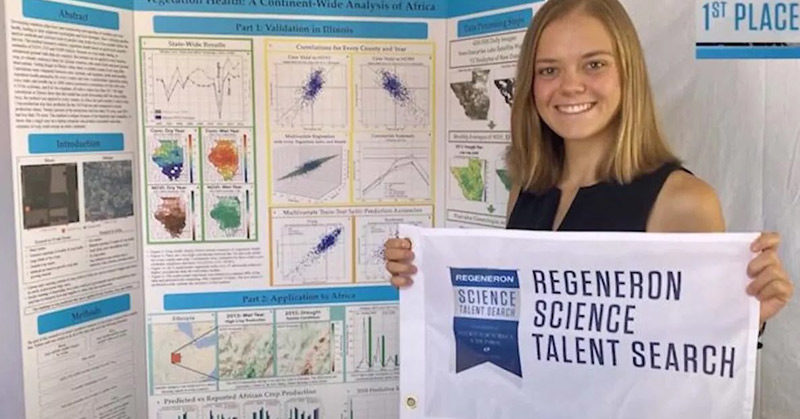Every year, approximately 1800 high school seniors enter the Regeneron Science Talent Search competition. It’s the most prestigious pre-college science and mathematics competition in the United States.
Of that 1800, three hundred students are selected and given two thousand dollars each in awards. From there, forty finalists are flown to Washington DC to compete for an additional 1.8 million dollars of prize money. The ultimate winner receiving a quarter of a million dollars [1].
For the first time in the competition’s nearly eighty-year history, the 2020 competition was held completely online, but that did not damper the ingenuity of the competitors. This year, the winning prize went to Lillian Kay Peterson of Los Alamos, New Mexico, who took home the 250 thousand dollar purse for her ingenious invention.
The Winning Submission
What does it take to win the top prize at such a prestigious competition? Solving world hunger, apparently.
Seventeen-year-old Lillian Kay Peterson’s winning invention was a simple tool that allows farmers to predict harvests early in the growing season to help improve food distribution planning and could serve as a valuable resource for groups working on global food insecurity [2].
The tool analyzes daily satellite imagery using accepted measures of vegetation health. Kay Peterson validated her tool by first testing it on known domestic crop data, then tested it for countries in Africa. All of her tests successfully predicted harvest yields with remarkable accuracy when compared with reported crop yields.
The young girl’s parents had adopted two children who had faced food insecurity, and Kay-Peterson had read about a famine in Ethiopia that had affected millions of people and led to developmental learning problems in children. This is what motivated her to focus her attention on food insecurity for the competition [2].
Read: Father and Son Build 50,000 New Beehive Colonies Around the World
Starvation in Africa
In April 2020, the Executive Director of the World Food Programme (WFP) warned that the spread of COVID-19 has sparked one of the worst humanitarian crises since the Second World War.
Beasley described 135 million people, many of whom are in Africa, as facing crisis-levels of hunger or worse. The novel coronavirus crisis has now pushed an additional 130 million people to the edge of starvation.
“If we can’t reach these people with the life-saving assistance they need, our analysis shows that 300,000 people could starve to death every single day over a three-month period”, he upheld. “This does not include the increase of starvation due to COVID-19” [3].
In a request for assistance, Mr. Beasely has expressed the need for early warning systems.
“If we don’t prepare and act now – to secure access, avoid funding shortfalls and disruptions to trade – we could be facing multiple famines of biblical proportions within a short few months.” [3]
Of the twenty-five “hot spots”, or regions that are at the highest risk for famine, most being in Africa. They stretch from West Africa, across the Sahel to East Africa, including the Democratic Republic of the Congo, Mozambique, and Zimbabwe [4].
Read: Teen Scientist Creates SMART Armor Shield To Help in Radiation Treatment
The Runner-Ups
The second-place entry and winner of 175 thousand dollars was 18-year-old Jagdeep Bhatia of Green Brook, New Jersey. He developed two machine learning algorithms for computer programs. They attempt to learn new concepts under the guidance of either a computer or a human instructor. His AI algorithms could help train robots and other automated devices faster and easier [5]. The third-place prize of 150 thousand dollars went to eighteen-year-old Brendan Crotty of Muskogee, Oklahoma. Crotty designed and an efficient hybrid gas burner that could help reduce the environmental impact of industries like power generation and materials manufacturing. His system emits nineteen percent less nitrogen dioxide gas, a potent pollutant [5].
Maya Ajmera, president of the Society for Science & the Public which runs the contest, called students like Peterson stewards of the future.
“The current pandemic has made it clear how important science is to our wellbeing. With these finalists at the forefront of scientific and engineering discovery, I know we are in good hands. They will be solving the world’s most intractable problems.” [2]
Keep Reading: 8-Year-Old Girl Invents Solar-Powered Water Heater and Wins Nuclear Sciences Prize
- https://www.regeneron.com/responsibility/sts-isef#:~:text=The%20Regeneron%20Science%20Talent%20Search,demonstrating%20exceptional%20scientific%20leadership%20potential.
- https://www.goodnewsnetwork.org/regeneron-science-talent-search-2020-winner/
- https://news.un.org/en/story/2020/04/1062272
- https://news.un.org/en/story/2020/07/1068601
- https://investor.regeneron.com/news-releases/news-release-details/teen-scientists-win-18-million-virtual-regeneron-science-talent

